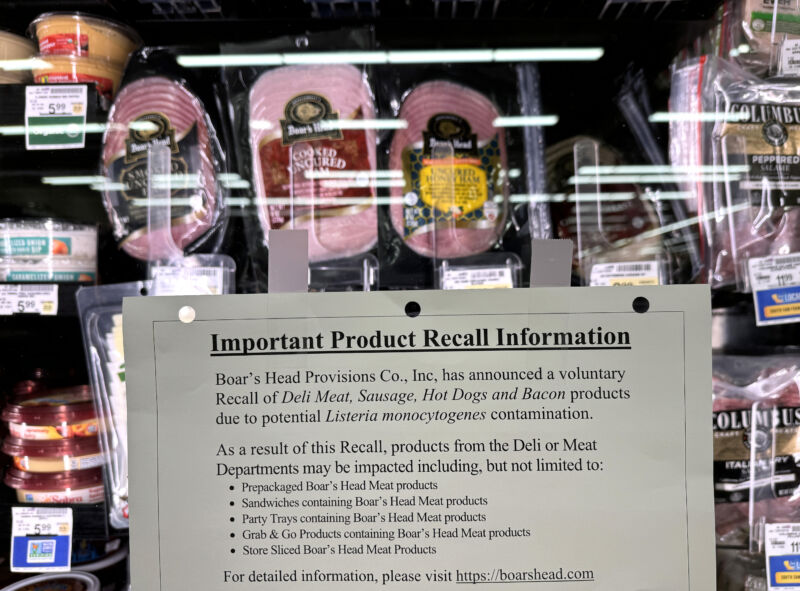

A third person has died in a nationwide bacterial outbreak linked to Boar’s Head brand deli meats. Last week, the company recalled more than 7 million pounds of its meats, which was in addition to a recall of over 200,000 pounds of meat from July 26. In all, 71 types of products made between May 10, 2024, and July 29, 2024, and sold nationwide have been recalled.
According to an update Thursday from the Centers for Disease Control and Prevention, the outbreak has now sickened a total of 43 people, an increase from 34 last week. There have been 43 hospitalizations, up from 33 last week. The illnesses are reported from 13 states. The three deaths in the outbreak include one from Illinois and one from New Jersey, and the newly reported death is from Virginia. The CDC expects the tally of illnesses so far to be a significant undercount of actual cases, and additional states may be affected.
The illnesses in the outbreak are caused by Listeria monocytogenes, a foodborne bacterium that is particularly dangerous to people who are pregnant, people aged 65 years or older, and people who have weakened immune systems. In these high-risk groups, the bacteria are more likely to move beyond the gastrointestinal system to cause an invasive infection called listeriosis. During pregnancy, listeriosis can cause miscarriage, stillbirth, premature delivery, or a life-threatening infection in newborns. For non-pregnant people who develop listeriosis, nearly 90 percent require hospitalization, and one in six die.
Symptoms of listeriosis can include fever, muscle aches, headache, stiff neck, confusion, loss of balance, and convulsions that are sometimes preceded by diarrhea or other gastrointestinal symptoms.
Growing outbreak
Many more people may be sickened in the outbreak than the current numbers indicate. For many infected people, the bacteria only cause relatively mild infections that don’t require medical care. Even if they do seek medical care, laboratories don’t routinely test for listeriosis in patients with mild gastrointestinal illnesses. Lastly, while many infected people develop symptoms within two weeks of an exposure, symptoms can develop up to 10 weeks after eating a contaminated food, and there are additional lag times in connecting cases to an outbreak.
According to an investigation by the CDC, the first cases detected in the outbreak date back to the end of June. Health investigators in Maryland and New York independently identified L. monocytogenes in unopened containers of Boar’s Head brand liverwurst. Further testing confirmed at the end of July that the strain of L. monocytogenes found in the liverwurst products matched the strain making people sick in the outbreak.
The CDC advises people not to eat any of the recalled products. Instead, discard them or return them for a refund. Boar’s Head has a list of the recalled products on its website. The CDC advises consumers to look for “EST. 12612 or “P-12612” inside the USDA mark of inspection on the product labels. People who purchased recalled products should clean their fridges, according to the US Department of Agriculture.